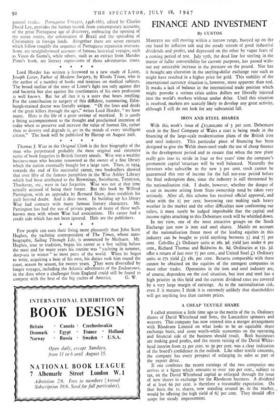FINANCE AND INVESTMENT
By CUSTOS
MARKETS are still moving within a narrow range, buoyed up on the one hand by inflation talk and the steady stream of good industrial dividends and profits, and depressed on the other by vague fears of a coming period of test. July 15th, the dead line for sterling in the matter of fuller convertibility for current purposes, has passed with- out any noticeable increase in the pressure on the pound. Nor has it brought any alteration in the sterling-dollar exchange rate such as might have resulted in a higher price for gold. This stability of the international currency situation is, however, more apparent than real. It masks a lack of balance in the international trade position which might provoke a serious crisis unless dollars are liberally injected into the world's markets without undue delay. Until this situation is resolved, markets are scarcely likely to develop any great activity, although I still do not look for any substantial fall.
IRON AND STEEL SHARES
With this week's issue of D5,000,000 of 3 per cent. Debenture stock in the Steel Company of Wales a start is being made in the financing of the large-scale modernisation plans of the British iron and steel industry. This particular piece of financing has been designed to give the Welsh sheet-steel trade the use of cheap finance in the development period and to ensure that when the new plant really gets into its stride in four or five years' time the company's permanent capital structure will be well balanced. Naturally the investors who subscribe to the new 3 per cent. stock cannot be guaranteed this rate of income for the full ten-year period before the final redemption date, since the industry is still threatened by the nationalisation risk. I doubt, however, whether the danger of a cut in income arising from State ownership need be taken very seriously. After all, this scheme has received official approval, and what with the 21 per cent. borrowing rate making such heavy weather in the market and the other difficulties now confronting our rulers, it must surely be judged improbable that the capital and income rights attaching to this Debenture stock will be whittled down.
In my view, one of the most attractive groups on the Stock Exchange just now is iron and steel shares. Mainly on account of the nationalisation threat most of the leading equities in this industry can be bought to yield anything between 57:- and 71 per cent. Colvilles Ordinary units at 26s. 9d. yield just under 6 per cent., Richard Thomas and Baldwins 6s. 8d. Ordinaries at 13s. 3d. offer a return of just over 71 per cent., and United Steel Li Ordinary units at 27s yield £5 18s. per cent. Returns comparable with these cannot be obtained on the equities of the strongest companies in most other trades. Operations in the iron and steel industry are, of course, dependent on the coal situation, but iron and steel has a high priority in this field and the current dividend rates are covered by a very large margin of earnings. As to the nationalisation risk, even if it matures I think it is extremely unlikely that shareholders will get anything less than current prices.
A CHEAP TEXTILE SHARE
I called attention a little time ago to the merits of the Is. Ordinary shares of David Whitehead and Sons, the Lancashire spinners and weavers. This company has now entered into a merger arrangement with Rhodeson Limited on what looks to be an equitable share exchange basis, and some worth-while economies on the operating and financial side of the business should result. Both businesses are making good profits, and the recent raising of the David White- head interim from 25 per cent, to 3o per cent. was a clear indication of the board's confidence in the outlook. Like other textile concerns, the company has every prospect of enlarging its sales as part of the export drive.
If one combines the recent earnings of the two companies one arrives at a figure which amounts to over zoo per cent., subject to tax, on the David Whitehead capital as enlarged through the issue of new shares in exchange for the Rhodeson business. A dividend of at least 6o per cent. is therefore a reasonable expectation. On that basis the Is. shares, now standing around 9s. in the market, would be offering the high yield of 6.1 per cent. They should offer scope for steady improvement.


































 Previous page
Previous page